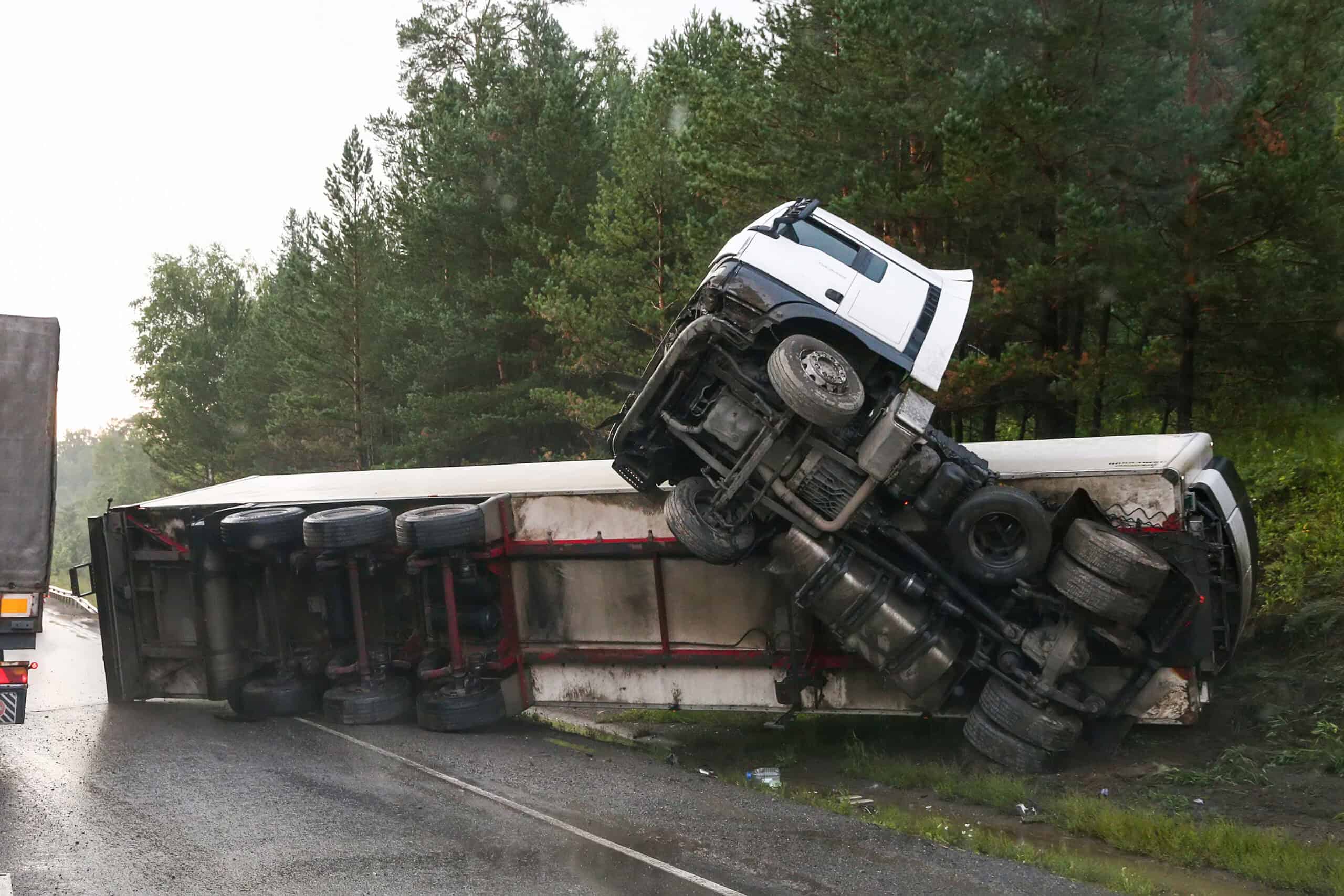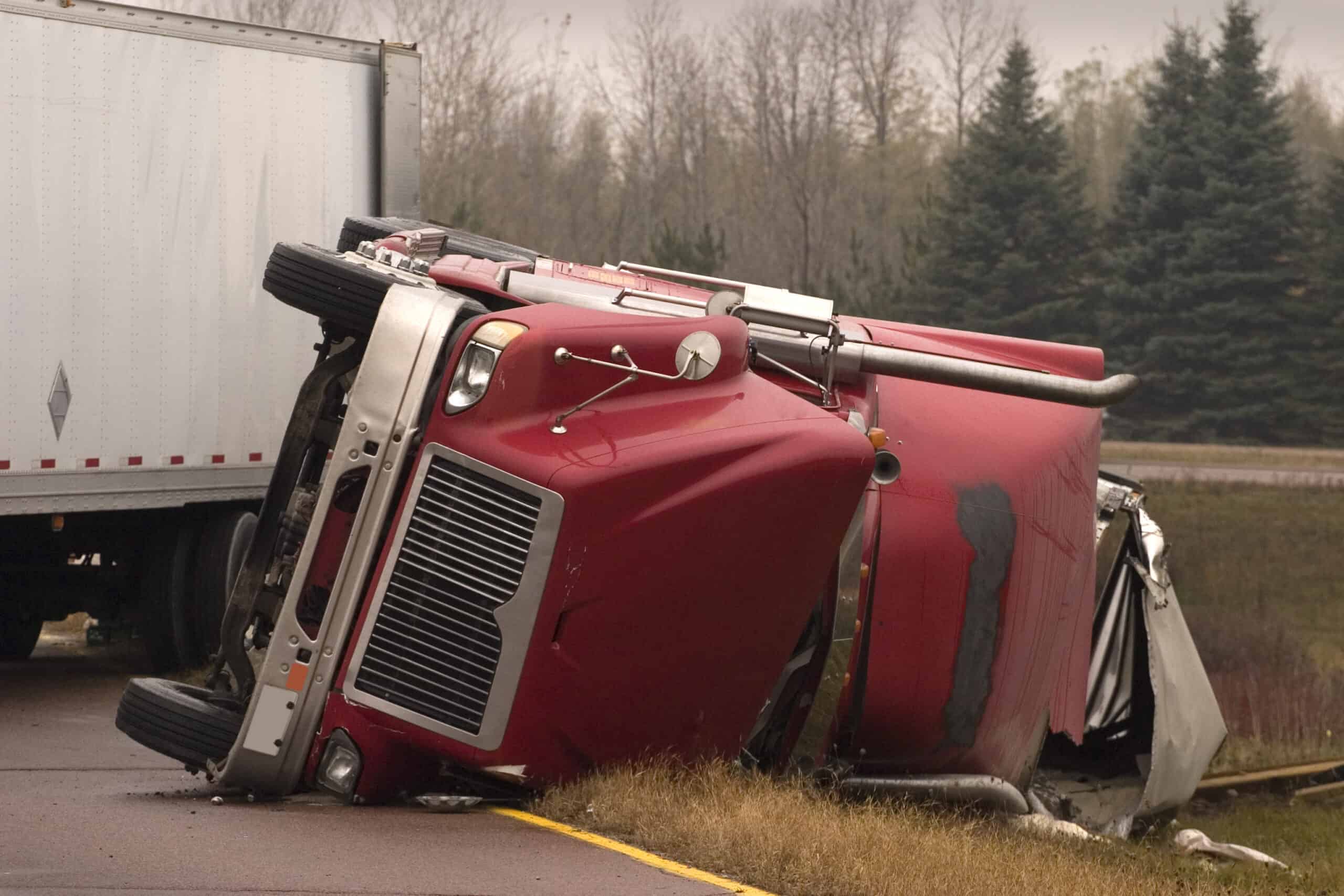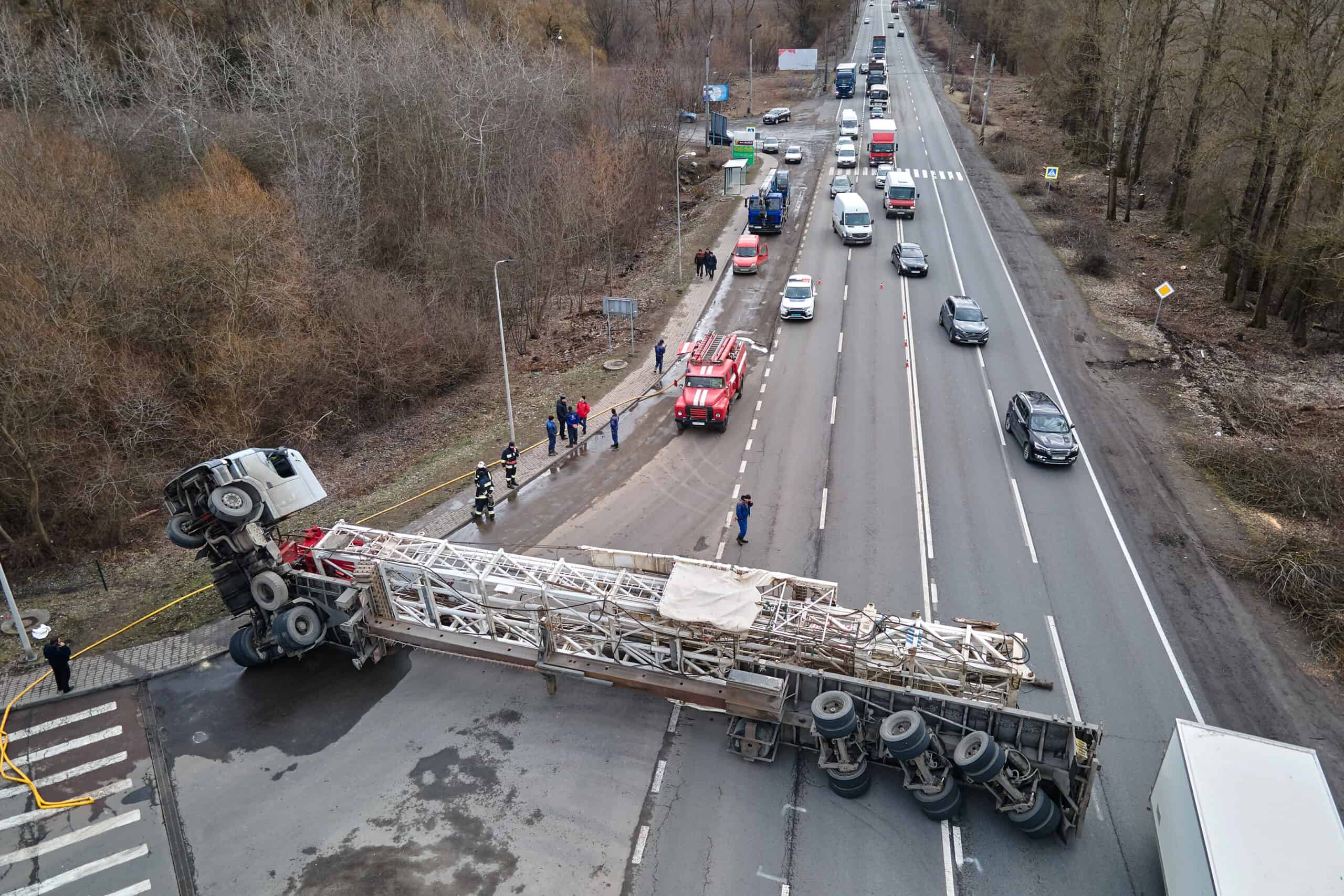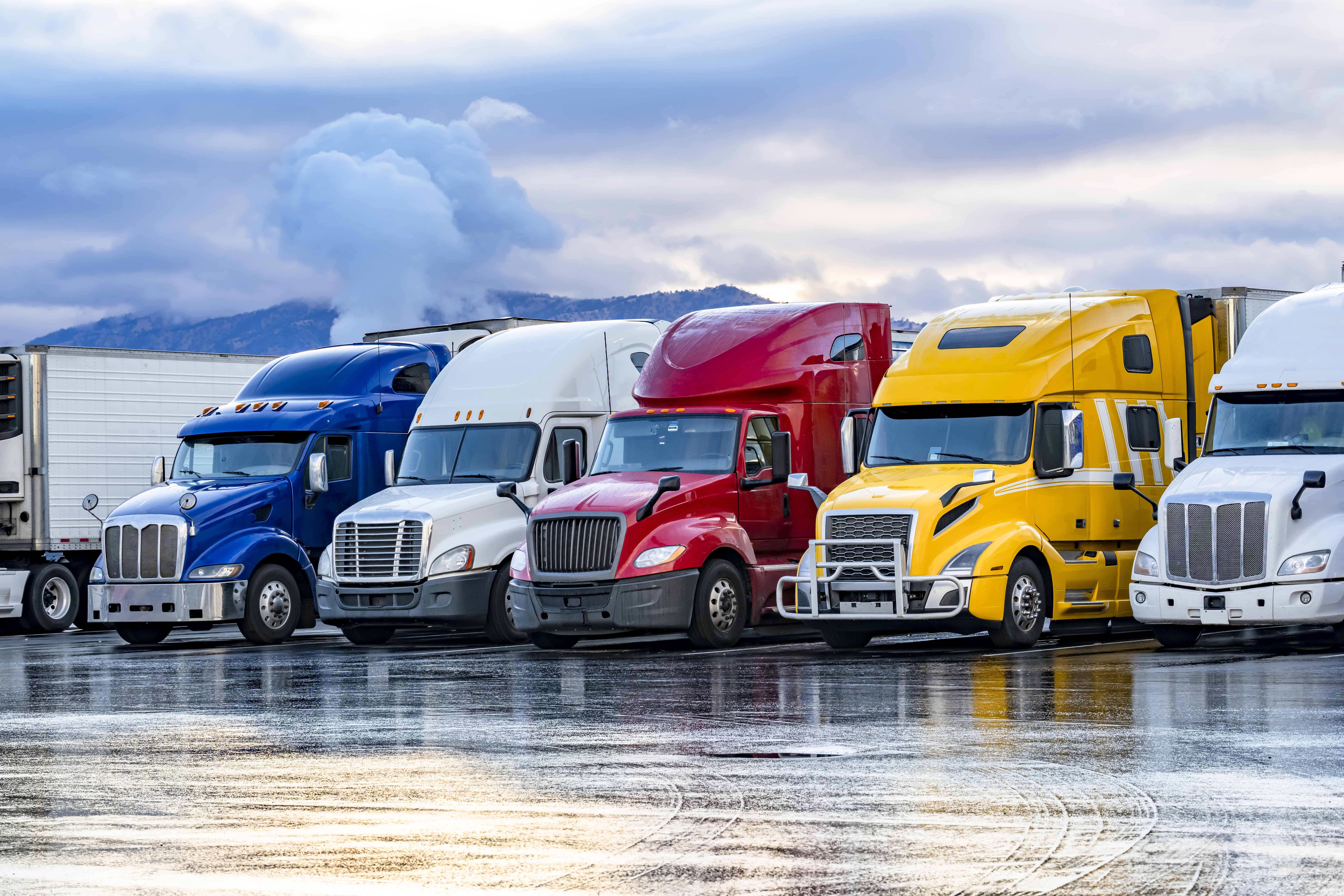Jackknife Truck Accident Lawyer
Doehrman Buba Ring is equipped with seasoned truck accident lawyers who are ready to assist if you have been injured in a jackknife accident. Our team has a deep understanding of the complexities associated with these types of collisions and is committed to fighting for the rights and compensation of truck accident victims. If you have been injured in a jackknife truck accident and are unsure of your options to seek compensation, contact an experienced truck accident attorney at Doehrman Buba Ring for a free consultation.

What is a Jackknife Truck Accident?
A jackknife accident occurs when a large truck, towing a trailer, folds in such a way that the trailer swings out and forms an acute angle with the truck, resembling the folding of a pocket knife. This dangerous situation often results from sudden maneuvers, poor road conditions, or braking errors, making the trailer lose alignment with the truck cab and skid uncontrollably.
Why Are Jackknife Truck Accidents So Dangerous?
Jackknife truck accidents are particularly hazardous due to their unpredictable nature and the substantial danger they pose to other road users. When a truck jackknifes, it often leads to a loss of control over both the truck and the trailer, causing them to span across multiple lanes of traffic, which can result in multi-vehicle collisions. Furthermore, the suddenness of jackknife collisions leaves little time for other drivers to react, increasing the likelihood of high-speed impacts. The size and weight of an out-of-control truck and trailer can cause devastating damage to smaller vehicles, making it difficult for occupants to escape unharmed. Additionally, jackknifed trucks can obstruct roadways, leading to significant traffic delays and increasing the risk of subsequent accidents in the vicinity.
What to Do If You Have Been in a Jackknife Truck Accident
If you have been involved in a jackknifing truck accident, taking immediate and appropriate action is crucial for ensuring your safety and strengthening any potential compensation claims. Here are important steps to follow:
- Ensure Safety: First and foremost, ensure that you and anyone involved are safe. Move to a secure location away from traffic if possible.
- Call Emergency Services: Contact emergency services immediately to report the accident and any injuries. Police and medical assistance will be dispatched to the scene.
- Document the Scene: Take photographs and videos of the accident scene, including the positions of vehicles, skid marks, road conditions, and any visible damages or injuries. This visual evidence can be invaluable in subsequent legal actions.
- Exchange Information: Exchange contact and insurance details with the other parties involved in the accident. Include names, addresses, phone numbers, driver’s license numbers, license plate numbers, and insurance policy numbers.
- Seek Medical Attention: Even if you do not feel injured immediately following the accident, it is crucial to undergo a medical evaluation. Some injuries may not be immediately apparent.
- Report the Accident to Your Insurance Company: Notify your insurance company about the accident as soon as possible. Provide them with an honest account of what happened, but avoid admitting fault or liability.
- Consult with a Truck Accident Lawyer at Doehrman Buba Ring: Contact a knowledgeable truck accident lawyer who specializes in accidents involving commercial vehicles like semi-trucks. An experienced attorney can guide you through the legal process, help you understand your rights, and work to secure the compensation you may be entitled to for your injuries and damages.
Following these steps can help safeguard your wellbeing and legal rights after a jackknife truck accident.

Common Causes of Jackknife Truck Accidents
Jackknife accidents can be attributed to several common causes, each influencing the likelihood of such incidents on the roads.
Braking Technique
Improper braking technique is a leading cause of jackknife accidents. When a truck driver applies the brakes too suddenly or with excessive force, particularly on slick or uneven road surfaces, it can cause the trailer to lose control and begin to skid. This loss of control makes it possible for the trailer to swing out and form a dangerous angle with the cab, similar to the action of a jackknifing knife. Additionally, if the truck’s brakes are not properly maintained or if the brake pressure is unevenly distributed across the trailer, the risk of jackknifing increases significantly. Truck drivers must be trained to understand the dynamics of their vehicles and use braking techniques suited to the size and load of their trucks to minimize the risk of jackknife accidents.
Sudden Maneuvers
Sudden maneuvers are another critical factor contributing to jackknife accidents. When a truck driver makes an abrupt turn, changes lanes, or attempts to avoid an obstacle on the road, the swift movement can lead them to lose control of the vehicle. This sudden adjustment often results in the trailer swaying or tipping, especially if the truck is moving at a high speed or if the load is improperly secured. The trailer’s momentum can force it into an uncontrollable skid, initiating the jackknife motion. Such maneuvers require a high level of skill and awareness from the driver, highlighting the importance of comprehensive training and experience in preventing these types of accidents.
Poor Road Conditions
Poor road conditions significantly contribute to the risk of jackknife truck accidents. Roads that are wet, icy, or have uneven surfaces can greatly increase the likelihood of a truck losing traction and control, particularly when navigating turns or during braking. Potholes, debris, and other obstructions can also cause a driver to undertake sudden maneuvers, further elevating the risk of a jackknife situation. Additionally, inadequate road maintenance and poorly marked construction zones can lead to confusion and abrupt changes in driving behavior, compounding the dangers. It’s crucial for truck drivers to remain vigilant and adjust their driving according to road conditions, as well as for transportation agencies to ensure that roads are properly maintained and hazard-free to minimize the occurrence of such accidents.
Mechanical Failures
Mechanical failures in the truck itself are a significant cause of jackknife accidents. These can range from a brake failure, where the braking system does not engage properly to slow or stop the vehicle, to tire blowouts that suddenly compromise the truck’s stability. Faults within the engine or transmission can also lead to unexpected loss of power, making it difficult for the driver to control the vehicle. Additionally, issues with the trailer’s coupling device can result in the trailer detaching or pivoting uncontrollably, setting the stage for a jackknife scenario. Regular maintenance and thorough inspection of trucks are essential to identify and rectify any mechanical issues that could potentially lead to a jackknife accident. Ensuring that all parts of the truck, especially those critical to its operation and control, are in good working condition can significantly reduce the risk of such dangerous occurrences on the road.
Overloading Semi-Truck Trailer
Overloading or improperly loading a semi-truck trailer contributes significantly to the occurrence of jackknife accidents. An overloaded trailer can cause an imbalance in the distribution of weight, leading to difficulties in maneuvering and controlling the vehicle. This imbalance becomes particularly dangerous during braking, as it may lead to uneven distribution of forces across the truck, increasing the risk of the trailer swinging outwards and initiating a jackknife scenario. Similarly, if the cargo within the trailer is not properly secured or is unevenly distributed, it can shift during transit. Sudden shifts in cargo can alter the center of gravity of the vehicle abruptly, making it more prone to losing control, especially in the case of quick maneuvers or while navigating turns. Ensuring that trailers are loaded within their specified weight limits and that cargo is evenly distributed and securely fastened is crucial in preventing these types of accidents. Proper training in load management for drivers and loading crew is also essential in mitigating the risk associated with overloading and improper loading of truck trailers.
High Speeds
High speeds exacerbate the risk of jackknife accidents significantly. At elevated speeds, a truck’s stopping distance increases, and the driver’s reaction time decreases, making it more challenging to respond effectively to road conditions or unexpected situations. Furthermore, the higher the speed, the greater the force exerted on the truck during maneuvers such as turning or braking, which can lead to loss of control and potentially a jackknife scenario. Speed also affects the stability of the trailer; rapid changes in direction or sudden stops are more likely to cause the trailer to sway or skid, initiating a jackknife. It is essential for truck drivers to adhere to speed limits and to adjust their speed according to the weight of their load, road conditions, and weather to mitigate the risk of accidents. Regulatory bodies also play a critical role by enforcing speed limits and ensuring that trucking companies and drivers comply with safety regulations designed to prevent high-speed-related jackknife accidents.
Understanding these causes is crucial for both preventing jackknife accidents and for legal professionals in building a case following such an incident.

How Passenger Vehicles Can Avoid Jackknife Truck Accidents
Avoiding a jackknife truck accident as a passenger vehicle driver involves staying aware and adopting safe driving practices around large trucks. Here are strategies to reduce the risk:
Maintain a Safe Distance
Passenger cars should keep a significant distance between your vehicle and trucks, especially on highways. This provides more time to react if a truck begins to jackknife or if sudden braking is necessary.
Be Cautious in Poor Weather Conditions
Poor weather can make roads slippery and reduce visibility, increasing the likelihood of accidents. Exercise extra caution and reduce your speed when driving near trucks in these conditions.
Avoid Blind Spots
Commercial trucks have larger blind spots than passenger vehicles. Stay out of these “No-Zone” areas to ensure the truck driver can see you, reducing the risk of collisions that could lead to a jackknife scenario.
Pass Safely
When passing a truck, do so quickly and safely to minimize the time spent in the truck’s blind spot. Always pass on the left where the driver has better visibility, and never cut in front of a truck abruptly.
Observe Truck Signals
Pay attention to a truck’s turn signals and give them plenty of room to maneuver. Trucks may require extra lanes to turn or merge; anticipating and accommodating these movements can prevent unsafe situations.
Stay Alert and Focused
Always be alert to the actions of trucks and trailers around you. Avoid distractions, so you’re ready to respond to sudden changes in traffic flow or potential jackknife incidents.
By implementing these strategies, passenger vehicle drivers can contribute to safer roads and minimize the chances of being involved in a jackknife truck accident.
Who Is Liable for a Truck Accident?
Determining liability in truck accidents, including jackknife accidents, can be complex due to the multiple parties involved. Liability may fall on one or more of the following entities, depending on the specifics of the accident:
- The Truck Driver: If the accident was caused by the driver’s negligence, such as speeding, distracted driving, or failing to adhere to safety regulations, the truck driver might be held liable.
- The Trucking Company: Trucking companies can be held responsible if the accident resulted from inadequate training, failure to enforce driving hours regulations, or neglecting to maintain the trucks properly.
- Truck Manufacturers: If a mechanical failure contributed to the accident, and it can be proven that the failure was due to a manufacturing defect, the manufacturer of the truck or the defective part may be liable.
- Cargo Loaders: Improperly loaded or secured cargo can cause a truck to jackknife. Liability may fall on the party responsible for loading the truck if their negligence led to the accident.
- Maintenance Companies: If the accident was caused by a failure to maintain the truck properly, and another company was contracted for maintenance, that company could be held liable.
Liability is determined by thorough investigation, including analyzing police reports, witness statements, company records, and accident scene evidence. It often requires legal expertise to interpret these details and establish negligence. Therefore, consulting with a skilled truck accident lawyer can be crucial in identifying all liable parties and pursuing the rightful compensation for damages and injuries sustained in a truck accident.

If You Have Been Injured in a Jackknife Truck Accident, an Experienced Truck Accident Attorney at Doehrman Buba Ring Will Help
The team at Doehrman Buba Ring possesses extensive experience in handling truck accidents, including complex jackknife truck accidents, and stands ready to assist if you have been injured. Our deep understanding of the legal, technical, and practical aspects of these accidents ensures that clients receive comprehensive support throughout their case. Leveraging our expertise in handling personal injury lawsuits involving large commercial trucks, Doehrman Buba Ring meticulously investigates the circumstances of each accident to identify all liable parties and secure the compensation their clients deserve. Call us today for a free consultation if you’ve sustained injuries in a truck accident. Partnering with Doehrman Buba Ring can significantly enhance your ability to navigate legal challenges and achieve a favorable outcome.



